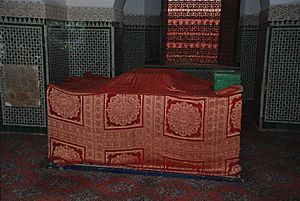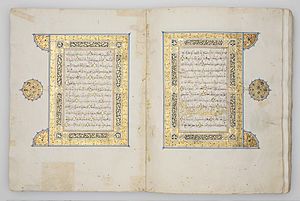Qadi Iyad facts for kids
Quick facts for kids Qāḍī ʿIyāḍ |
|
|---|---|
| Religion | Islam |
| Denomination | Sunni |
| Personal | |
| Born | 1083 Ceuta, Almoravid empire |
| Died | 1149 Marrakesh, Almohad empire |
| Senior posting | |
| Title | Shaykh al-Islām Al-Ḥāfiẓ Qāḍī |
ʿIyāḍ ibn Mūsā (1083–1149), often called Qadi Iyad, was a very important Muslim scholar. His full name was Abū al-Faḍl ʿIyāḍ ibn Mūsā. He was known as a "polymath," meaning he was an expert in many different subjects. He was especially famous for his deep knowledge of Islamic law (called fiqh) and the sayings and actions of Prophet Muhammad (called hadith). He was also a theologian, historian, poet, and genealogist.
Contents
A Life of Learning
Early Life and Education
Iyad was born in 1083 in Ceuta, a city that is now part of Morocco. He came from a well-known family of scholars. This meant he had the chance to learn from the best teachers in Ceuta. His first important teacher was Abu ʿAbd Allah Muhammad b. ʿIsa, who helped him get his basic education.
As he grew up, Iyad learned a lot from scholars who traveled through Ceuta. These scholars came from different parts of the Islamic world, like al-Andalus (Spain), the Maghrib (North Africa), and the eastern lands. Iyad became a respected scholar himself and gained support from important people in society.
To learn even more, Iyad traveled in 1113 and 1114. He visited cities like Cordoba, Murcia, Almeria, and Granada in Spain. He met many famous scholars of his time, including Abū ʿAlī al-Ṣadafī, who was a top expert in hadith.
His Career as a Judge
In 1121, Iyad was chosen to be a judge (called a Qadi) in Ceuta. He served in this important role for 15 years, until 1136. During this time, he wrote many books and became very famous for his knowledge of Islamic law.
Later, he also worked as a judge in Granada for about a year. He was also a teacher to other famous scholars, including Averroes and Ibn Maḍāʾ.
Exile and Death
Iyad led a revolt against a new group called the Almohades when they came to Ceuta. However, his side lost, and he was sent away to a place called Tadla. Later, he was moved to Marrakesh.
He passed away in 1149. He had refused to accept Ibn Tumart, the leader of the Almohades, as the awaited Mahdi. There are different stories about how and where he died. Some sources say he became friendly with the Almohads in Marrakesh and died of sickness during a military trip. Other stories say he died a natural death while working as a judge near Tadla. Later stories sometimes suggest he was killed by the Almohads. Even though he disagreed with the Almohads, he did not hate their school of Islamic thought.
His Lasting Influence
Qadi Iyad's ideas had a big impact on later scholars. He influenced thinkers like Ibn Taymiyyah and Taqī ad-Dīn as-Subkī. He was known for saying that Muslims who spread bad things about Prophet Muhammad or questioned his authority should face serious punishment.
Today, a major university in Morocco is named after him: Cadi Ayyad University in Marrakech. Qadi Iyad is also known as one of the Seven Saints of Marrakesh, and his burial place is near a gate called Bab Aïlen in the city.
His Important Works
Qadi Iyad was one of the most famous scholars of the Maliki school of law. He wrote many important books, including:
- Ash-Shifa: This is his most famous work. It talks about the virtues and special qualities of Prophet Muhammad.
- Tartib al-mardarik wa-taqrib al-masalik li-marifat alam madhab Malik: This book is a collection of biographies of important scholars from the Maliki school of law.
Other well-known books by Qadi Iyad include:
- Ikmal al-mu`lim bi fawa'id Muslim: A famous commentary on Sahih Muslim, which is a collection of hadith.
- al-I`lam bi Hudud Qawa'id al-Islam: This book explains the five pillars of Islam.
- al-Ilma` ila Ma`rifa Usul al-Riwaya wa Taqyid al-Sama`: A detailed book about the science of Hadith (how hadith are collected and verified).
- Mashariq al-Anwar `ala Sahih al-Athar: This work is based on other important hadith collections like al-Muwatta, Sahih Al-Bukhari, and Sahih Muslim.
- Daqa`iq al-akhbar fi dhikr al-janna wa-l-nar: This book describes the joys of jannah (heaven) and the horrors of jahannam (hell).
See also
- List of Ash'aris and Maturidis
 In Spanish: Cadí Ayyad para niños
In Spanish: Cadí Ayyad para niños
 | Audre Lorde |
 | John Berry Meachum |
 | Ferdinand Lee Barnett |



